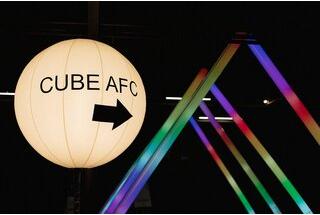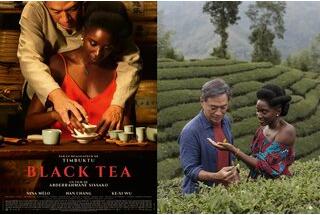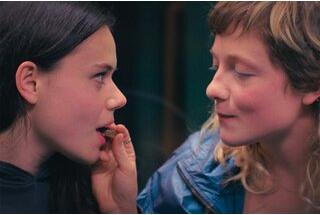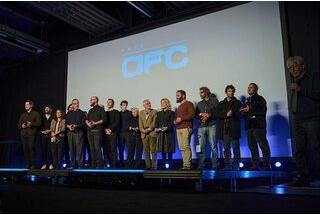Discussion with Haya Khairat, 2023 "Angénieux Special Encouragement"
"Burn like a Fire in Cairo", by François Reumont for the AFCIs this your first time in Cannes ?
Haya Khairat : Yes, I’m going to Cannes for the first time in my life ! And that’s no mean feat for an Egyptian filmmaker. Cannes is still a word which makes me feel overwhelmed... Well, rather, an idyllic immersion. It is of course a dream come true when you are invited to the biggest festival in the world. Being encouraged to progress in my work, my images being appreciated for what they are.... and will maybe be seen by people from all over the world. It’s an almost indescribable feeling, but one that fills me with strength and confidence. It’s as if my strongest inner voice was shouting in my ears "Trust yourself, you are on the right track !" Another special thing is that this award is not given for a particular project. It is a collective encouragement for my work, which makes it even stronger personally.
What does the Angénieux brand mean to you ?
HK : I think everyone in the film industry knows this brand. As an assistant, Angénieux is first and foremost a super heavy, super expensive zoom lens that everyone on set cherishes and is just too afraid to drop inadvertently. I personally like zooms a lot, and I use them often because they allow me to create more dynamic movements missing from the camera, especially on a Dolly Panther. I’m also an admirer of the optical quality that these zooms have achieved, almost imitating the rendering of fixed lenses.
Where did you get the urge to make moving images ?
HK : Since I was a child, I have always been attracted to art. I discovered photography through my father. Every Sunday, he used to take me to visit Cairo and take pictures with him in a very simple way. We would then take the roll of film to the lab... this little ritual became one of the things I looked forward to the most every week.
I then remember the Polaroid camera he gave me for my 8th birthday. I fell in love with this object immediately. Since then, every birthday present has revolved around the same passion. Be it a new film camera, a new walkman, an MP3 player... until my first DSLR at the age of 16. Alongside images, music was also very important in my learning process. I can still see myself singing a lot of popular songs from my childhood, such as those by Norah Jones. When we acquired a computer for our home, I started playing with it, rewinding clips of my favourite singers, picking up shots from trailers and films to create new ones. This relationship between music and images has always fascinated me. In the family car, I used to listen to the radio, while imagining a little film to go with it based on what was around me. Traffic lights, crowds, streets, buildings, and clouds in the sky formed the patterns for these little clips in my head. These car rides were such a joy for me because of that.

How did you start working professionally ?
HK : My first jobs were as a portrait artist with my camera. I had my own Facebook page, and I offered my services. I started photographing weddings, various events around the school, like graduations. At the same time, I extended my passion for music videos by starting to make my own, without editing what had already been done ! That’s when I said to myself that I had found my way. I wanted to get into film, and filming in particular. During this self-taught journey, I learned a lot. Looking back, I realise that it was as if I already had everything in me... that it was in my genes. As time went by, reading books and watching a lot of films and clips, I started writing a script, framing, lighting a set, editing and colour grading myself. Basically, making a film. But I didn’t do all this process in a state of mind of saying “OK, now I study cinema”... I just wanted to continue following this passion, born during my childhood. And satisfy my thirst to learn and to spend more and more time practicing it.
What was the trigger for your career ?
HK : It was a short film called For Women Who Are Difficult to Love, based on a poem by Warsan Shire. Shortly after that I also shot a commercial for the Egyptian brand Cleo. These may not have been my best work, but they were the two films that got me started as a director and cinematographer. Soon after, projects started to blossom, and I stopped being an assistant camera operator to devote myself entirely to directing and cinematography.

What inspires you as a filmmaker ?
HK : Most of all, I would say it is the reality I find around me, the people, the landscapes, and the chaos. All of this forms the stories I capture that inspire me. To be honest, I am always observing. As soon as someone speaks to me or walks by, I pay attention to all the details. It’s my way of visualising what I’m being told, of immersing myself in a story, by being part of it. For example, strolling through the streets of Cairo, watching people in traffic, or just by the beach, is really my thing. When I’m alone, after a while, I always find myself observing, listening to music, or reading a book. These are my three main sources of inspiration. And, as I told you, photography was the basis of my creative impulse. It is the heart of my work, and in a way, a kind of ’secret passage’ to the child artist inside me. It happens sometimes now that I’ll start by taking a simple photo, and then end up with a video clip, with a story, that it inspired. And this is also the case if I come across someone else’s image that speaks to my heart.
What about the work of other filmmakers ?
HK : If I have to name someone, I would say the Lebanese filmmaker Nadine Labaki. For me, this woman is the perfect example that proves one does not have to imitate men in their own environment. The way she assumes her femininity while being very tough and brave about her career is something I admire. The fact that she is both an actress and a director, confidently showing all the layers of her personality both in front and behind the camera. To me, it’s also a way to not be reduced by society’s standards, and to let one’s power as an artist be expressed.... Another filmmaker whose work I also greatly admire is Michel Gondry. His films have inspired me a lot, especially his way of going beyond the limits, the academicism, while remaining extremely simple, sometimes childish, and of course extremely touching. This is particularly true of Eternal Sunshine of the Spotless Mind which remains one of my favourite films. Finally, more recently, I was very impressed by Damien Chazelle’s Babylon, a film that literally set me on fire. The story grabbed me, suddenly bringing me back to that passion felt in the early days, and which can sometimes waver at times through one’s artistic career.
What is the state of the market and work opportunities for you in Egypt ?
HK : Since I started, and even now, I have quite a few opportunities as the demand for new faces is always there in the industry. It’s great, from that point of view, to still be in the ’young cinematographer’ category, but I’m now thinking of the next step, where I’ve started projecting myself in a more established filmography or projects. I’m mainly using this time to gain experience and develop my personal projects. The only hard thing is getting into the film industry. Too few producers dare to invest in young talents, unless they already have what they are looking for in their demo tape. Not to mention the difficulty of finding people who believe in you and are willing to help you develop your own scripts.
What about being a woman cinematographer in the Middle East ?
HK : It’s always a challenge. But much less so than when I started, and lets not even talk about the years before I started. During my studies, I remember very well being often asked “Why do you want to be a director of photography ? It’s really a hard job for girls, you’ll suffer. Why not edit movies instead ?” Then, during one of my first professional shoots as an assistant cameraman, I still remember the cameraman greeting me and asking me, “Did you really come to pull focus ? Or rather so I would film you ?” That was nine years ago, and I still remember it like today. These are just a few examples of the behaviour that women face on set, whether in the Middle East or really anywhere in the world. Fortunately, as the older generations pass on the baton to us, the gender gap in film is narrowing. I really hope that in the future, especially in Egypt, more and more women will be doing this job. And in so doing, honour Nancy Abdelfattah, who was for me a great example, being the first great woman director of photography in our country.
(Interview conducted by François Reumont, and translated from French by Alexander B. Raiffe for the AFC)
Visual material by Angénieux
 En
En Fr
Fr





